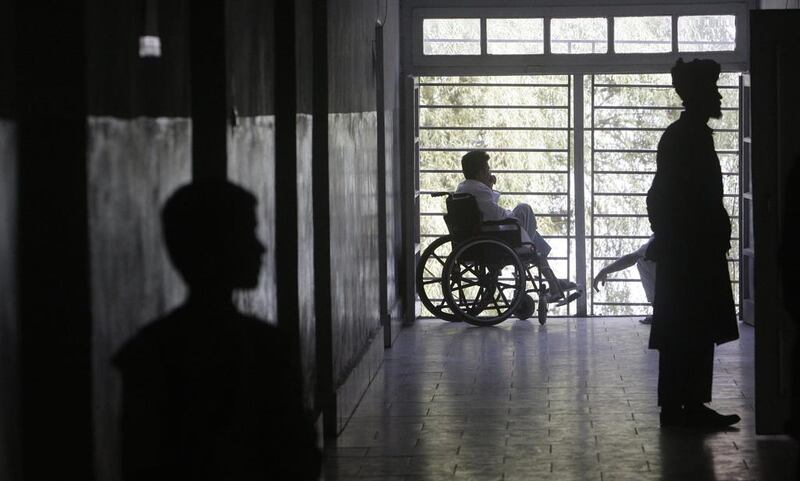KABUL // On a stiflingly hot afternoon this Ramadan, Neyamatullah waited in a Kabul hospital, hoping that his wife’s leg would not be amputated.
Gulalai was around eight months pregnant and baking bread in the yard of their home in the Sangin district of Helmand province in southern Afghanistan when an explosion nearby sent a wall crumbling down on top of her.
“Heavy weapons were being fired and shells were landing. Even big artillery was used that day,” said Neyamatullah.
Summers in Afghanistan are always turbulent as the Taliban return from safehavens in Pakistan after the mountain passes thaw. However, this year has been particularly violent as government forces and the insurgents compete for the upper hand in the first fighting season since the withdrawal of most foreign troops from the country.
Assassinations, executions, gun battles and suicide bombings are just some of the ways to die in an increasingly confusing and indiscriminate war. Almost invariably, civilians are among the victims.
Neyamatullah and Gulalai got married about three years ago, when US marines were still stationed in Sangin.
Helmand is one of the most volatile provinces in Afghanistan and Sangin one of its most dangerous districts but the couple survived relatively unscathed in their village until fate finally caught up with them in May.
They do not know precisely what happened, but they think a mortar fired by Afghan troops caused the explosion.
Gulalai was rushed to a local clinic that did not have adequate facilities to treat her. She was then taken to a government hospital in the provincial capital where her badly injured leg was put in plaster.
Soon afterwards she gave birth to a baby girl, her second child. A doctor later checked her wounds again and saw that her injured leg had become red and possibly infected. He warned it might need to be amputated.
As well as the daily threat of violence, people across Afghanistan have had to deal with severe poverty and a lack of basic services as the government struggles to provide even rudimentary healthcare in many provinces.
As a result, Neyamatullah eventually found help from a local civil society activist, Agha Mohammed Qurishi, who collected donations and raised enough money for them to take the long and dangerous bus journey to Kabul, where government hospitals tend to have better facilities.
Kidnappings and ambushes are common on the highway leading to the capital, but they eventually arrived safely. Now that further treatment has left Neyamatullah confident his wife’s leg can be saved, he has to worry about braving the same treacherous route back home.
Mr Qurishi told The National he decided to help the couple after imagining how he would feel if his sister or daughter suffered a similar injury.
“It is the job of the government to help its people, but I have seen too many tragedies before and I still see them now,” he said.
A report released this summer by the US-based Brown University found that about 26,270 civilians have been killed in conflict-related violence in Afghanistan since the war began in 2001. The United Nations has documented 266 civilian casualties from rockets and mortars in the first three months of 2015, up 43 per cent from the same period in 2014.
There was no respite from the violence even during Ramadan this year.
On July 1, government forces raided a hospital run by Doctors Without Borders in the northern province of Kunduz, shooting in the air and assaulting staff. On July 7, two suicide bombings hit Kabul on a single day and less than a week later, another suicide attack in Khost province killed at least 25 people.
In a potential breakthrough, however, Taliban representatives recently held talks in Pakistan with an Afghan government delegation but their exact remit remains unclear.
In his Eid message, the Taliban’s spiritual leader, Mullah Mohammed Omar, vowed to continue what he described as “our sacred jihad” but also endorsed “political endeavours”.
The insurgents have been making significant military gains and the emergence of ISIL in parts of the country has only complicated matters further.
Amid all this, the old battlegrounds of the war continue to kill and maim. Nowhere is this more apparent than in Helmand, which became a major focus for US reinforcements in 2010 after heavy losses among British troops there.
Nasima Niazi, a local MP, said fighting has escalated in several areas this year and claimed that civilians and Afghan security forces were dying because they could not get proper medical treatment.
“The main casualties are caused by [roadside bombs], mines and heavy weapons, which are used by both sides,” she said.
Despite the escalating conflict, the new Afghan government has yet to agree on a minister of defence since taking over in September last year.
About 9,800 Americans troops are still based in the country, but only a few hundred are due to remain by the end of 2016. In an article for the Washington Post, David Petraeus, the former commander of Nato forces in Afghanistan, described this as "playing roulette with Afghanistan's future". The presence of US troops, however, remains deeply divisive among ordinary people.
Musa Khan Kakar, a 22-year-old labourer, is another resident of Helmand who has suffered in the fighting.
One morning earlier this year members of his family were travelling from his engagement ceremony when their Toyota Corolla was struck by a roadside bomb in Musa Qala. His father, uncle, aunt and the driver of the car were all killed. His mother was seriously injured.
“We don’t have land, shops or money,” he said. “Apart from God, we have nothing in this world.”
foreign.desk@thenational.ae





